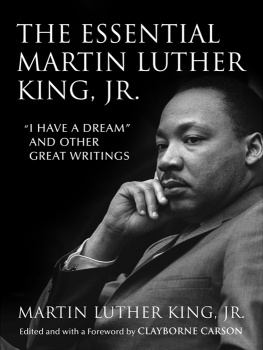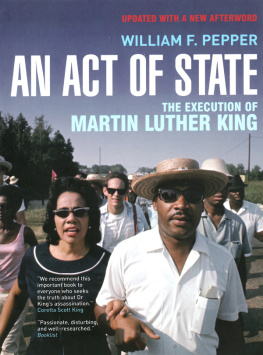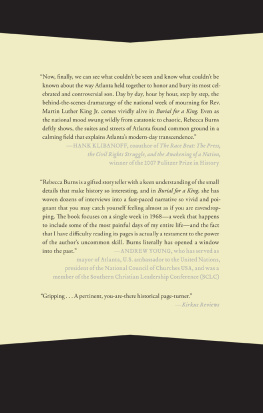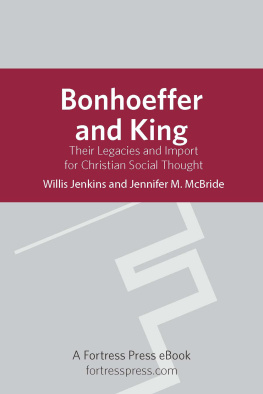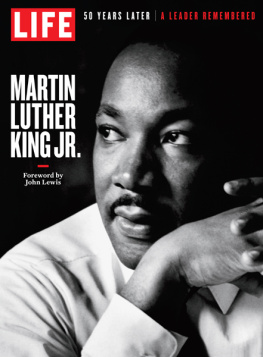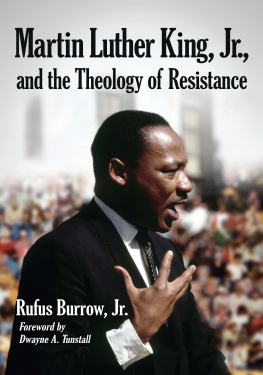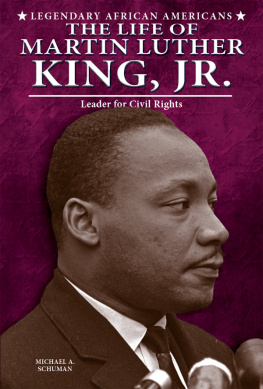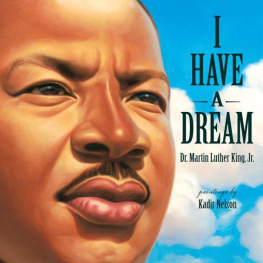

Foreword
The chronologically arranged speeches, sermons, and writings selected for this book express the evolving visionary ideas of Dr. Martin Luther King, Jr. A Baptist minister unexpectedly chosen to be the principal spokesperson for the Montgomery bus boycott, King then became the president of the Southern Christian Leadership Conference (SCLC), the nations best-known civil rights proponent and nonviolence advocate, a Nobel Peace Prize laureate, a prominent critic of American military intervention in Vietnam, and the leader of the Poor Peoples Campaign. Kings public statements reflect the remarkable growth of his leadership abilities during a tumultuous era of rapid social change.
Even as Dr. King developed his skills as a leader, he also displayed a consistency in his thoughts about the meaning of the modern African American freedom struggle. This anthology enables readers to understand how Dr. Kings experiences both transformed and reinforced his basic convictions. His role as a civil rights leader was rooted in his more fundamental identity as a social gospel advocate, who conveyed a distinctive set of Christian principles, as well as traditional American democratic ideals, to a global audience.
When I participated in the 1963 March on Washington for Jobs and Freedom, I was fortunate to witness an exquisite example of Dr. Kings oratory, but I did not then understand the full meaning of Kings concluding I Have a Dream speech. Only after his widow, Coretta Scott King, chose me to edit her late husbands papers did I begin to appreciate Dr. Kings most famous speech in the broader context of his life and times. In cogent, metaphorically rich passages, his speech expressed the universal longing for freedom and justice.
Dr. King used his remarkable oratorical skills to inspire listeners to believe that their struggles to free themselves from oppression were historically, globally, and morally significant. When he spoke on New Years Day in 1957 at an Emancipation Day rally in Atlanta, he announced, Those of us who live in the twentieth century are privileged to live in one of the most momentous periods of human history. The Montgomery boycott, he suggested, was linked both to nineteenth-century struggles against the old order of slavery and to twentieth-century struggles against the old order of colonialism. Using a passage that he would later adapt for his Dream oration, Dr. King insisted, Freedom must ring from every mountainside, even in the heart of Dixie: Let freedom ring from every mountainsidefrom every molehill in Mississippi, from Stone Mountain of Georgia.
By the time he delivered his Nobel lecture, in December 1964, Dr. King was even more determined at insisting that the goals of the Southern freedom struggle extend beyond civil rights reform. The biblical Exodus story was an opening chapter in a continuing story. The present struggle in the United States is a later chapter in the same unfolding story. As he had on many previous occasions, Dr. King tied the American civil rights movement to broader global trends: All over the world, like a fever, the freedom movement is spreading in the widest liberation in history. He called for a new consciousness, saying that humanity had inherited
a great world house in which we have to live togetherblack and white, Easterners and Westerners, Gentiles and Jews, Catholics and Protestants, Moslem and Hindu, a family unduly separated in ideas, culture, and interests who, because we can never again live without each other, must learn, somehow, in this one big world, to live with each other.
With the passage of the Voting Rights Act of 1965, the civil rights movement had dealt a decisive blow against the Jim Crow system of segregation and discrimination, but as Dr. King turned his attention from the South to the urban slums of Chicago, he reasserted his basic Social Gospel convictions. Although his public statements during his final years were often interpreted as departures from his earlier civil rights agenda, when Dr. King asked Where do we go from here? at the SCLC convention in 1967, his call for the restructuring the whole of American society reflected the radical views he had expressed as a graduate student many years earlier.
When Dr. King answered critics who complained that a civil rights leader should not question President Johnsons Vietnam War policies, he responded that the inquirers have not really known me, my commitment or my calling. Indeed, their questions suggest that they do not know the world in which they live. Dr. King explained that he and other founders of the SCLC could not limit our vision to certain rights for black people but had instead adopted the motto To save the soul of America. He identified with those bound by allegiances and loyalties which are broader and deeper than nationalism.
Dr. King also faced sharp criticisms when he came to Memphis in March 1968 to support a sanitation workers strike, but this decision gave him his final opportunity to reaffirm his global vision. Though the nations media had largely ignored the strike until Dr. King participated in a march marred by violence, his Mountaintop speech, given on the eve of his assassination, placed it in a global context. Throughout the world, Dr. King said, masses of people are rising up with the same cry: We want to be free.
Although the world was all messed up, Dr. King assured his audience that he preferred to live just a few years in the second half of the twentieth century than during any previous period of history. He was happy to join with those confronting the problems that men have been trying to grapple with through history, including the issue of war and peace and the struggle to bring the colored peoples of the world out of their long years of poverty, their long years of hurt and neglect.
Dr. Kings visionary ideas remain relevant a half century since his death. Because of the expanding breadth of his vision, he remains an inspiring symbol for historys greatest freedom strugglethat is, the long and continuing efforts of the majority of humanity to overcome oppression based on class, race, ethnicity, gender, physical disability, and sexual orientation. Dr. King saw a Promised Land awaiting not only black Americans but all of Gods children struggling to be free at last.
Clayborne Carson
Professor of history and founding director of the Martin Luther King, Jr., Research and Education Institute at Stanford University
From Facing the Challenge of a New Age.
From Nobel Lecture.
From A Time to Break Silence.
From I See the Promised Land.
1
Our Struggle
(1956)
The segregation of Negroes, with its inevitable discrimination, has thrived on elements of inferiority present in the masses of both white and Negro people. Through forced separation from our African culture, through slavery, poverty, and deprivation, many black men lost self-respect.
In their relations with Negroes, white people discovered that they had rejected the very center of their own ethical professions. They could not face the triumph of their lesser instincts and simultaneously have peace within. And so, to gain it, they rationalizedinsisting that the unfortunate Negro, being less than human, deserved and even enjoyed second-class status.
They argued that his inferior social, economic and political position was good for him. He was incapable of advancing beyond a fixed position and would therefore be happier if encouraged not to attempt the impossible. He is subjugated by a superior people with an advanced way of life. The master race will be able to civilize him to a limited degree, if only he will be true to his inferior nature and stay in his place.
Next page
